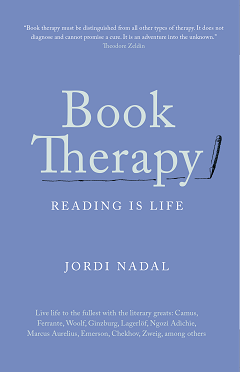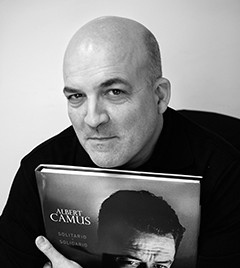Menú
- Inicio
-
Catálogo
- Colecciones
-
Temas
- Ficción
-
No Ficción
- Arte
- Biografías y memorias
- Ciencia
- Deporte y entretenimiento
- Derecho
- Desarrollo personal
- Educación y parenting
- Empresa y gestión
- Espiritualidad
- Filosofía
- Gastronomía
- Historia
- Informática
- Maternidad
- Política
- Psicología
- Religión
- Salud y bienestar
- Sociología / Antropología
- Sostenibilidad / Medioambiente
- Viajes
- Autores
- Leer es vida
- Vive las librerías
- Premios literarios
- Plataforma Editorial
- Home page
- Foreign rights
- Psychology and Personal Development
- Booktherapy. Reading is life.
Booktherapy. Reading is life.
Live life to the fullest with the literary greats: Camus, Ferrante, Woolf, Ginzburg, Lagerlöf, Ngozi Adichie, Marco Aurelio, Emerson, Chekhov, Zweig, among others.
248 pages
By: Jordi Nadal
Rights sold to: English Language (Mensch Publishing)
All humans die, but some books can live for ever because every time a book is read it is transformed into a new creature, understood in a new way, inspiring unexpected reactions. Jordi Nadal’s book is by a very rare kind of reader, a publisher, one of that tiny and mysterious group of people who decide which author’s scribblings see the light of day. I have had the good fortune of having Spanish translations of three of my books translated by his firm, Plataforma. It has been an extraodinarily wonderful experience.
It has shown me how one person’s profoundest feelings about what is worth while in life can express themselves in a business that knows how to triumph over the merciless realities of earning one’s daily bread. I have admired and been moved by his enthusiasm for noble causes, his numerous acts of generosity, his capacity for friendship, his dedication to truth and honesty, and his seemingly inexhaustible energy.
This book gives only a hint of his eclectic, multilingual, international knowledge and tastes, but it is unusual in revealing how each book he has read has changed and illuminated his own life and ignited passionate excitement. I am surprised by what he has chosen to emphasise about many of the items in his list of favourite readings. I interpret this as illustrating the impossibility of predicting what effect an author will have on readers, who very often find ideas in a book quite different from what the author intended. It is not only authors who give birth to ideas. Every new book one reads, or at least those books that have ideas inside them, may lead to the unexpected birth of an unexpected new thought, a new interest, a new vision of what life is about.
So book therapy must be distinguished from all other kinds of therapy. It does not diagnose, and it cannot promise a cure. Out of the two million books published each year in the world, many have no other ambition than to put the reader to sleep, or to amuse, or to instruct, or to help pass the time which would otherwise be devoted to fighting against boredom. For me, book therapy means the experience of meeting a stranger. A book is an opportunity to have a conversation with a stranger, a silent conversation which may sometimes continue for years. And though some authors who write many books may sometimes be repeating themselves, others may be evolving, expanding their horizons, discovering new hopes, so that each new book may be by a slightly different person. Book therapy is an adventure into the unknown.
Theodore Zeldin, Oxford, March 2021.
The Origin of Book Therapy
Reading Reviews
Why these authors
Books are balsamic
Books cure what doctors can't
About Jordi Nadal
Jordi Nadal was born in Lliçà d’Amunt (Barcelona) in 1962 and holds a degree in Germanic Studies from the University of Barcelona. In 1998 he completed his studies in Stanford Professional Publishing Course.
He began his career at Vicens Vives and continued at Herder (Germany). Among other positions, he has been director of EDHASA, editorial and publications director of Círculo de Lectores, consultant at Random House in New York, general director of corporate development for Spain and America at Grupo Plaza & Janés and assistant director at Ediciones Paidós, as well as Deputy General Manager at Planeta Agostini Profesional and Formación.
He is co-author of the book Meditando el Management… y la vida (Planeta, 2007, Plataforma Editorial, 2012) and Libros o velocidad. Reflexiones sobre el oficio editorial (Fondo de Cultura Económica, Madrid and Mexico, 2005), and author of Todo tan cerca (Poliedro, 2005) (translated into 6 languagues), El paraíso interior (Plataforma, Editorial, 2011), Todo lo que tengo es el silencio (Estrella, 2020), Libroterapia (Plataforma, 2020) and La invención de la bicicleta (Plataforma, 2020).
If you want to know more, please visit the author's websites:
© Plataforma Editorial 2024 C/ Muntaner, 269, entlo. 1ª - 08021 Barcelona (Spain) +34 93 494 79 99




